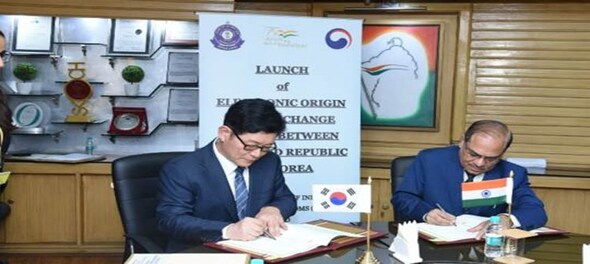
The recent launch of the India-Korea Electronic Origin Data Exchange System (IK-EODES) marks a significant advancement in the Electronic Data Interchange (EDI) initiatives of Indian Customs.
This move, as outlined in the press release following the launch, is expected to expedite the clearance of imported goods under the CEPA. "The system aims to facilitate the smooth implementation of the India-Korea Comprehensive Economic Partnership Agreement (CEPA) by way of electronic exchange of origin information between the two customs administrations in respect of the goods traded under the CEPA. The data fields in a Certificate of Origin (CoO) shall be electronically shared by the exporting customs administration with the importing customs, as soon as the certificate is issued. This would facilitate faster clearance of imported goods," the release stated.
India and the Republic of Korea's CEPA encompasses ambitious objectives spanning Trade in Goods, Trade in Services, Telecommunication, movement of Natural Persons, and investment. Liberalising and facilitating trade in goods between the two countries involves extending preferential tariff treatment, meaning thereby the duty rate agreed to for the list of products which are annexed to the CEPA. These rates are lesser than the most favoured nation(MFN ) rates which are otherwise applicable to imports from countries with whom there are no preferential trade agreements.
Origin forms a key ingredient of any preferential trade agreement. It establishes the nationality of the product being imported to which the benefit of a preferential rate is being extended.
RoO’s are in effect the principles on the basis of which benefits are extended. Thus RoO’s are unambiguously spelt out in the preferential trade agreement. In the Indo-Korea CEPA the entire Chapter 3 deals with origin-this is the importance of this concept.
Originating goods have been defined as those wholly obtained or produced in the territory of the exporting country. Goods which are not wholly obtained or produced need to satisfy product specific rules with the underlying requirement of having regional value content which is not less than 35 percent of the Free on Board ( FOB ) value and which have undergone a change in the tariff classification at the six digit level. There is a formula for determining regional value content. Indirect materials are not considered for determining origin; several operations like packaging, washing and others specified are not considered for determining value.
All goods seeking to claim the benefit of the CEPA have to be accompanied by a Certificate of Origin. The format is as spelt out in the CEPA and covers details of the goods and the originating criterion being fulfilled. The Certificate is to be issued by designated authorities as spelt out in the CEPA. There are provisions also which permit verification at the behest of the importing country by an authority in the exporting country.
The Customs authority of the importing country is empowered to carry out verification retroactively. It is in this background that IK-EODES has to be seen. In terms of the EDI arrangement the certificates of origin will be shared electronically ensuring speedier verification and most importantly speedier clearance. Incidentally it may be recalled that India and Korea also have a Authorised Economic Operator Mutual Recognition Agreement ( AEO-MRA). This agreement extends a promise of speedy clearance to identified risk free entities-importers, exporters, customs brokers etc. The belief being that this will enhance trade between the countries.
Trade between the two countries has been doing well. Despite the first half of 2023 being impacted by the Russia -Ukraine war and a risk of a global economic downturn , trade touched $11.94 Billion. The overall trade balance is in favour of Korea with a trade surplus of $5.3 billion. Korea is a big ticket investor in India-since the 1980’s it is estimated that Korea has invested approximately $7.815 Billion.
Thus the IK-EODES is the latest in the series of proactive steps being taken to facilitate and increase trade. However this has to juxtaposed with the Customs ( Administration of Rules of Origin under Trade Agreements ) Rules 2020 or as more popularly known by the very inelegant sounding acronym-CAROTAR.
These rules in effect seek to put in place a several measures to verify goods seeking the benefit of preferential tariff. While the aim is laudable -to protect the domestic industry from misuse of free trade agreements which have been noticed , the result is a lot more red tape. CAROTAR thus lays down stricter rules of proof of origin to be presented - a new section 28DA was also introduced in the Customs Act.
The Central Board of Indirect Taxes (CBIC) should ensure the technologically driven facilitation measures like IK-EODES do not get stymied by knee jerk responses like CAROTAR. This will defeat all the outstanding work done by the Directorate of Systems of CBIC.
Check out our in-depth Market Coverage, Business News & get real-time Stock Market Updates on CNBC-TV18. Also, Watch our channels CNBC-TV18, CNBC Awaaz and CNBC Bajar Live on-the-go!


In Andhra Pradesh's silk hub, weavers' cry for help echoes through election season
May 3, 2024 12:24 PM
Feroze Gandhi to Rahul Gandhi: Rae Bareli's tryst with Congress
May 3, 2024 11:36 AM
Rahul Gandhi to contest from Raebareli, close aide KL Sharma from Amethi
May 3, 2024 8:39 AM
BJP's Hindi heartland dominance faces test in phase 3 polls
May 2, 2024 9:14 PM

